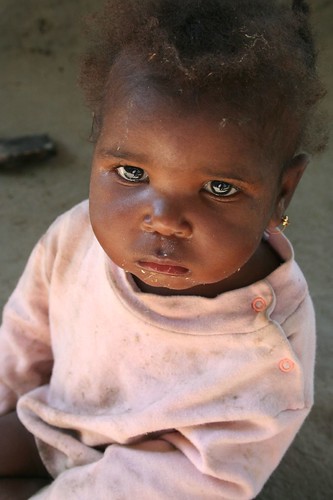When I’m on the ground working at one of our project sites, I spend most of my day observing. I walk with our public health workers through the villages, watching how they interact with families, seeing what their communities look like, scrutinizing the children and trying to tell if they are getting enough to eat, if there are mosquito nets hung in their huts, if there are pit latrines and clean wells available in the area. I take a lot of photographs and notes and try to come up with a plan to make our health projects more effective. A bit of what I saw in Beira — and I’ll warn you, some of these are disturbing:
This is a typical home in a village near Beira.
This is an improved method of hygiene that has been introduced. If your dishes air dry off the ground, they’ll stay cleaner and animals and children won’t be able to touch them either. (Obviously these still need to be washed.)
A health promoter interviews a family in Msena — a local language.
This family cultivates rice in one of the many flood plains nearby. They dry the rice on plastic sacks and then grind it with a giant mortar and pestle. They then take this ground material and put it in a large flat basket and wait for a slight breeze. When the breese is just right, they bounce the ground rice in the basket and the husk — which they’ve separated from the rice with the mortar — blows away in the wind leaving the rice ready for cooking. This process takes days for very little in terms of calories or vitamins gained. In other words, this isn’t Uncle Ben’s.
Speaking of vitamins, there is a malnutrition issue in many of these communities with babies. Babies who can’t breastfeed — because the mother died in birth, her milk didn’t come in, she’s HIV-positive and doesn’t want to feed the baby her milk, or the baby is lactose intolerant and can’t keep the milk down — die quickly. There is Plumpynut available for those who bring their children to the malnutrition feeding centers. This is a healthy baby being weighed.
In constrast, this is the one-year-old I described earlier. She was later taken to the central hospital and put on a feeding tube. She weighed 5.5kg at 14 months.
Her brother, who I carried to the clinic that day, was also malnourished and was cared for at the hospital. A more urgent issues was matakenyas — a worm that had invested his sweet little feet.
I heard the little girl in this photo crying before I saw her. Her mother is resting on the reed mat under the blankets in the far right side of the yard. She was 18 and had been sick since February.
Her little girl sat in the dirt, listening to her mother moan. I can’t imagine she was older than a year. She cried when we appeared, but seemed to otherwise be entertaining herself.
One week later when we returned to the community, the mother had died. I am not certain what will happen to this adorable little girl. With any luck, she’ll be taken to an orphanage where she’ll be fed and eventually sent to school. There was an HIV clinic offering free testing and treatment within a 15-minute walk of this village. I would guess stigma kept this woman initially from seeking care and handcuffed her family from doing anything after she was unable to do so for herself. If we can change one thing in southern Africa, may it be HIV-testing and treatment stigma. With treatment, people can live 20-25 years longer. It isn’t a cure, but it would have been a chance for this mother to see her little girl through childhood.
These beautiful women are some of the Mozambican saints who work and care for such children at orphanages. The work is thankless, tiring and never-ending. Yet, they do so with a smile that I have to believe only comes from a spirit fueled by God. They give me hope for the future of Mozambique.
That and the exceedingly obvious prevention messages that are becoming part of the culture. This condom machine provides customers at a cafe in central Beira more than just decaf or full-jolt.
~K














